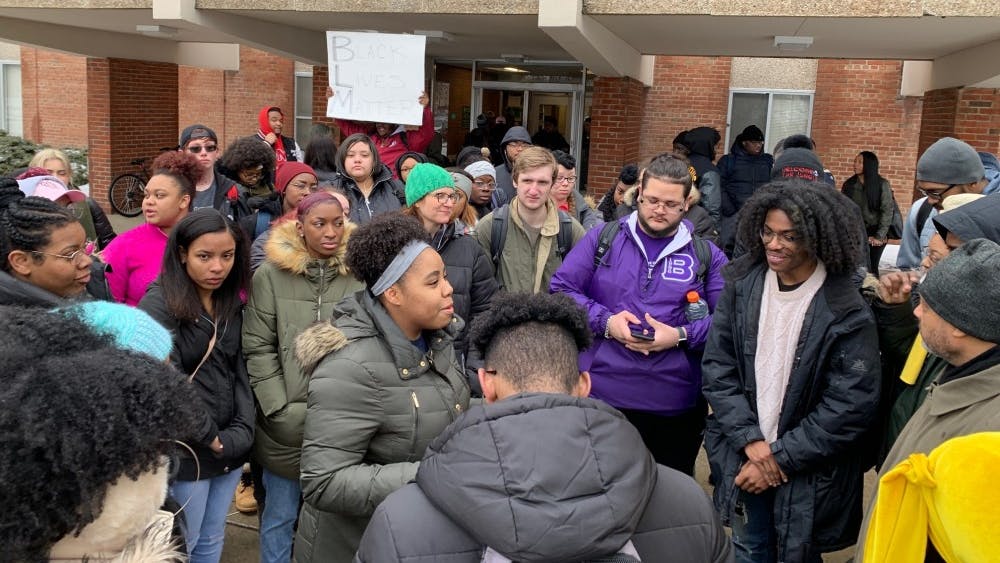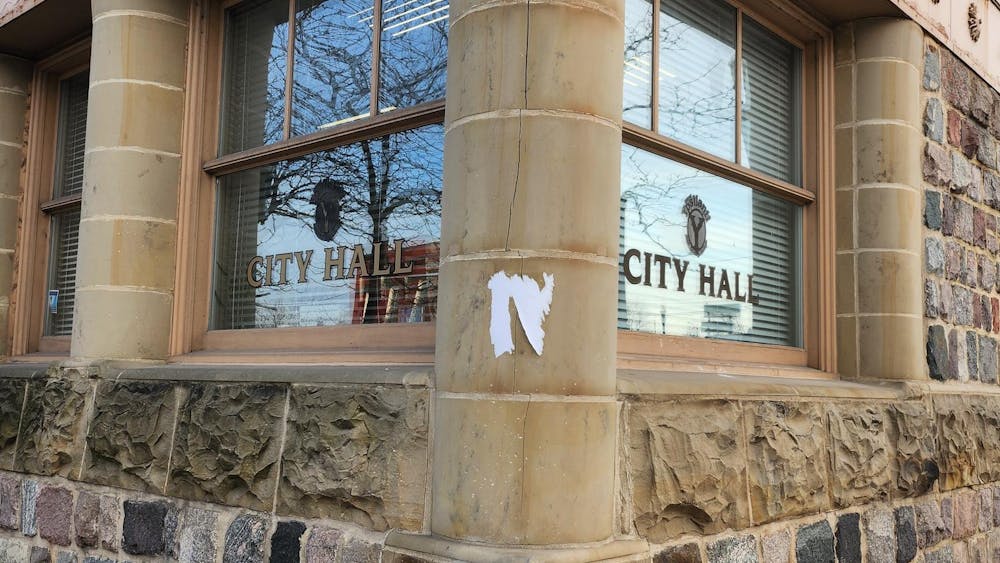A line of students formed in front of Jennifer Harding, a former drug addict and prisoner at the Women's Huron Valley Correctional Facility. Each one lauded her writing, thanked her for sharing her story and a few even gave her a hug.
Thus ended the most recent installation of the Star Lecture Series, where a panel of volunteers and poets shared their experiences in The Writer's Bloc, a poetry workshop held within the Women's Huron Valley Correctional Facility.
On Tuesday, Nov. 19, "The Writers' Bloc: Poetry from Inside Women's Huron Valley Correctional Facility," served as the third and final segment in this semester's Star Lecture Series, titled, "Ideas into Action." Rather than featuring the traditional single lecturer, a collective of facilitators and poets, as well as audio recordings of incarcerated women reciting their poetry took turns at the microphone.
EMU creative writing professor and Writer's Bloc organizer Dr. Rob Halpern acted as a moderator for the night. He described the transformative power of poetry that he has observed among the workshop's participants since his involvement in 2011. He also emphasized the concept of "poetry as practice," suggesting that poetry was not only a writing exercise but a tool with which writers could transform their relationships with their circumstances, with one another and with themselves.
Halpern went on to describe how one woman, Dinisha, used writing to cope with the traumatic living situation at the facility. She composed "Poetry as Resistance" during a time when prisoners were forced to ingest a medication that is primarily used for animals. In the piece, she expresses that collaborating on poems with the other women of Writer's Bloc not only helped her grieve but created "a bond greater than the circumstance, giving a voice to inhumane treatment."
The solidarity built through poetry was a prominent theme throughout the night. Speakers also emphasized the extent of the inhumane treatment that prisoners faced. Adam Malinowski, a volunteer Writer's Bloc facilitator, described a week-long quarantine that was enforced in January of this year. Visitors were prohibited and prisoners were forced to remain in their cells and hand over their belongings. According to Malinowski, the women were told that all this was being done to treat and prevent a "mystery rash" that had been spreading within the facility. Anyone who refused the forced administration of medication was threatened with 90 days of solitary confinement. Despite being told that the quarantine was a medical precaution, prisoners continued to live in unhealthy conditions, with brown water dripping from the faucets and black mold growing in the showers.
In response to the situation, Writer's Bloc participants collaborated on a poem titled "After the Quarantine: A Communiqué from the Women's Huron Valley Correctional Facility.” The four-stanza piece reflects fear and ange—"Words cannot change that we are not sufficiently human enough to warrant effective treatment since, to the world, we are humans." But in the midst of mostly mournful stanzas, some lines echo solidarity and hope—"Heave your chest in the direction of coming together at just the right moment, seizing power in the palm of our hands."
Jennifer Harding, perhaps the most memorable speaker of the night, read several of the poems that she composed during the 13 months she spent in the correctional facility. "It was what nightmares are made of," she said of her time there. While in incarceration, she was a mother, a sexual assault victim, a recovering drug abuser and in the process of a divorce. Harding didn't go into detail about how she was treated at the facility but stated that, "Animals at the shelter get treated better." Poetry served as her escape. "When I say the poetry workshop really helped me find closure on some, obviously, pretty traumatic issues, I mean that," she said. "I don’t have nightmares anymore."
When the floor was opened for a Q&A session at the end of the night, one student in the front row offered a word of thanks to the facilitators and poets who shared their stories. "It's easy to bury these things that are hard to talk about," said first year psychology student Coreena Forstner. She believes the Writer's Bloc, "brings humanization out of such a dehumanizing environment."
Between Forstner and those students who approached Harding at the end of the night, many found the discussion to be eye-opening.
Sophomore Music Therapy student Nichol Sayer, has been to other Star Lectures in years past but felt that this one stood out because of the format and content. "I think that sometimes, the Star Lectures can sound kind of boring but this one [was] exciting and it [was] interesting," she said. She went on to say that while the Women's Huron Valley Correctional Facility is just 20 minutes from campus, students never hear of what happens there. "We don’t really talk about prisons, so that narrative is unique."
Harding herself was moved by the experience, as well. "I think when you go to prison, when you [are incarcerated], you have this overwhelming sense of ‘What is this doing? What is this for? What good is going to come out of this?’" she said. "In my case, I was super lucky, because this [discussion] came out of this."
Anyone interested in accessing anthologies of products of The Writer's Bloc is invited to contact Dr. Halpern at rhalpern@emich.edu.










